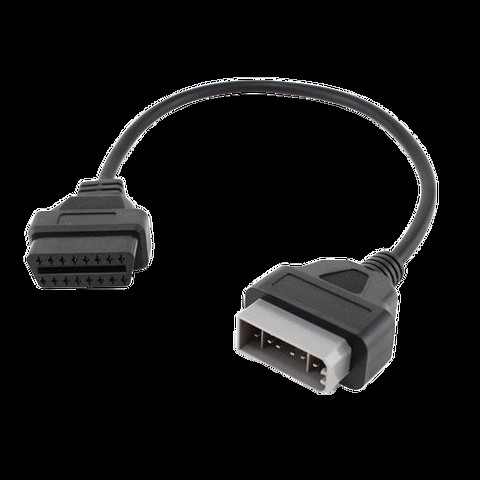Navigating the world of car diagnostics can be confusing, especially when you encounter terms like OBD1 and OBD2. A common question for car owners, particularly those with older vehicles, is: Can you check OBD1 systems with an OBD2 scanner? This article will clarify the differences between these systems and explain why compatibility is not as simple as it might seem.
OBD1 vs. OBD2: Understanding the Basics
OBD stands for On-Board Diagnostics, a system implemented in vehicles to monitor and report on various vehicle systems. The first generation, OBD1, was used in vehicles starting from the early 1980s up to the mid-1990s, although some vehicles continued using it even later, up to around 2006 in some cases. OBD2, the more advanced and standardized system, became mandatory in the USA in 1996 and gradually adopted worldwide. Generally, if your car is manufactured around 2006 or newer, it’s highly likely to be OBD2.
However, determining whether your car is OBD1 or OBD2 isn’t solely based on the year. For example, a 2003 Toyota Corolla is typically OBD1, while a 2004 model of the same car is likely to be OBD2. It’s crucial to verify the specific protocol for your vehicle’s make and model.
OBD2 Scanners and OBD1 Compatibility: The Truth
The straightforward answer to whether you can use an OBD2 scanner on an OBD1 system is no, not directly. OBD2 scanners are designed to communicate with vehicles using the OBD2 protocol. OBD1 systems, on the other hand, utilize different communication protocols that are not compatible with OBD2 scanners.
Think of it like different languages. An OBD2 scanner “speaks” the OBD2 language, while OBD1 systems “speak” different, older languages. An OBD2 scanner simply won’t understand or be able to interpret the diagnostic signals from an OBD1 system.
Adapters are available that change the physical connector shape to allow an OBD2 scanner to plug into an OBD1 port. However, these adapters do not magically convert the diagnostic protocol. They are simply wiring adapters that change the plug shape, not protocol converters. Therefore, even with an adapter, a standard OBD2 scanner will still not be able to read the data from an OBD1 vehicle.
Identifying OBD1 Ports and Adapters
OBD1 ports come in various shapes and pin configurations, and their locations can also differ. Common OBD1 port locations include under the dashboard on the driver’s side or sometimes even in the engine bay. Unlike the standardized 16-pin OBD2 port, OBD1 ports are not uniform.
For example, older Nissan vehicles often use a 14-pin OBD1 connector.
Toyota vehicles with OBD1 systems may feature a 22-pin port, often found in the engine bay.
To use a diagnostic tool with these OBD1 systems, you need not only an OBD1 compatible scanner but also the correct adapter cable for the specific port type in your vehicle.
OBD2 Shaped Ports Can Still Be OBD1
It’s also important to be aware that some older vehicles might have a 16-pin connector that physically resembles an OBD2 port, but they still operate on an OBD1 protocol. Connecting an OBD2 scanner to these ports will also not work, even though the plug fits. This is a common source of confusion. Always verify your vehicle’s OBD protocol, especially if it’s manufactured around the OBD1/OBD2 transition period.
A standard OBD2 port is typically a 16-pin connector, as shown above. While all OBD2 compliant vehicles will have this port, the presence of a 16-pin port doesn’t automatically guarantee OBD2 compliance, particularly in older models.
Choosing the Right Scan Tool
If you need to diagnose an OBD1 vehicle, you will require a specialized OBD1 scan tool. These tools are designed to communicate with the older protocols used by OBD1 systems. Many professional-grade scan tools are backward compatible and can read both OBD1 and OBD2 vehicles. In fact, a scan tool that is compatible with OBD1 protocols will almost always be able to read OBD2 as well.
Therefore, when selecting a scan tool, ensure it explicitly states OBD1 compatibility if you intend to use it on older vehicles. Using the correct tool ensures accurate diagnostics and avoids frustration and wasted effort.
In conclusion, while OBD2 scanners are excellent for diagnosing modern vehicles, they are not compatible with OBD1 systems. Attempting to use an OBD2 scanner on an OBD1 car, even with an adapter, will not work. For OBD1 vehicles, you need a dedicated OBD1 scan tool and potentially an adapter cable to match your vehicle’s specific OBD1 port. Always confirm your vehicle’s OBD protocol to choose the right diagnostic equipment.
